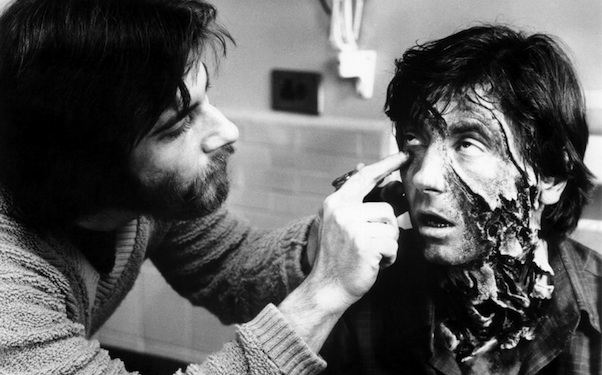
Physical makeup FX guru and all around silver screen legend Rick Baker is retiring. He cites his age and an ever-changing industry as the main reasons for this decision. As a life-long fan, it's hard to hear this and not starting finger-wagging at Hollywood for driving artistic geniuses like Baker out of the industry by settling for an onslaught of lazy computer-generated design work that can be accomplished at a quicker (but not always cheaper) pace than what Rick always specialized in.
This goes double when one accounts for the fact that Baker really was the final titan of his era of physical effects to walk away. Previous FX titans Dick Smith and Carlo Rambaldi were semi-retired from the late '80s onward and both passed away within the last three years. Gore maestro Tom Savini, while still active as an actor and director, has been semi-retired as an effects artist since the late '90s and the legendary Rob Bottin pretty much walked away from the industry over a decade ago. Stan Winston trucked along like the pro he always was until he sadly passed away seven years ago. Sure, we still have KNB FX and Amalgamated Dynamics expertly carrying on the legacies of Savini and Winston (respectively), as well as a few others still toughing it out in the trenches, but the old guard is gone. Rick Baker was truly the last of that particular generation, and it deeply saddens me to see him move on.
An announcement such as this shouldn't entirely be looked upon with doom and gloom, however. Instead, we should really just take the time to revisit and bask in Baker's past glories. The man has had one hell of a career. Early shlockier efforts like Octaman, Track of the Moon Beast and (appropriately enough) John Landis' Schlock all contain a good bit of cheesy fun. It wasn't all rubbery shenanigans for Rick in the '70s, though. In addition to assisting mentor Dick Smith on The Exorcist, Baker also made his mark on films like Brian De Palma's The Fury, grindhouse grossouts like The Incredible Melting Man and Jeff Lieberman's Squirm, and … of course … George Lucas' Star Wars.
It wasn't until the 1980s that the man truly came out swinging, however. The world was never the same after witnessing what might still be the greatest werewolf transformation ever put to film in John Landis' An American Werewolf in London. In many ways, Baker has been living in the shadow of what might still be viewed as his crowning achievement, alongside helping Michael Jackson and John Landis craft one of the greatest music videos of all-time. That said, his numerous works since are nothing to sneer at: Cronenberg's Videodrome, cult TV shows like Beauty and the Beast and Werewolf, Gremlins 2: The New Batch, The Rocketeer (creating the Rondo Hatton-esque Lothar!), Wolf, the Men in Black trilogy, Planet of the Apes (2001 – the movie is lousy, but those FX are nothing to scoff at!), Hellboy and The Wolfman (2010) among others.
There's a pattern at play, of course. As much as he can be lofted high for his work with ape makeups and animatronics or the fantastic transformations that he has helped Eddie Murphy make throughout his career, Rick Baker loved his monsters. While he might continue to age physically, deep inside he was always that same wide-eyed excited child who watched the monstrous creations of Jack Pierce and Bud Westmore stalk the inhabitants of the Universal Monster movies on the silver screen. Those creations caused his imagination to run wild as a youngster, and it is that same wide-eyed excitement that he brought to his own creations decades later, from the start of his career until this very day. Hell, check his Twitter account! It's filled to the brim with monster paintings that he works on daily.
Beyond his wonderful work that has been forever immortalized in cinema, Baker's greatest gift to mankind is not his movie monsters, but instead accomplishing the same feat that Pierce did in the 1930s and '40s: inspiring other wide-eyed children to grow up and make new monsters of their own. Baker might be leaving Hollywood behind, but somewhere out there (both inside the industry and not yet there) are a handful of future FX gurus who grew up with Rick's stuff and loved it so much that they too have pursued the very same path. It takes a child at heart to truly inspire children and that is something that Rick Baker managed to do time and time again throughout his illustrious career. I hope that we still get to see new work from him from time to time. Even if we don't, however, I can at least take solace in what we have and what he has/will inspire others to do in the future.
Now, if you'll forgive me, it's time that I wrapped this up and got on my way. After all, it's close to midnight …











